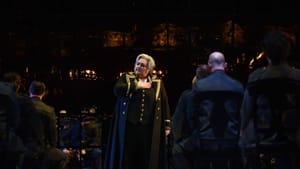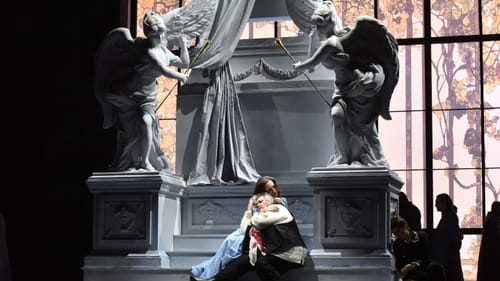Stay in the Loop
BSR publishes on a weekly schedule, with an email newsletter every Wednesday and Thursday morning. There’s no paywall, and subscribing is always free.
No more happy ending
Opera Philadelphia presents Gioachino Rossini’s 'Tancredi'

It’s always surprising when another century’s work parallels contemporary international events. This time, it’s Gioachino Rossini’s 1813 opera Tancredi, based on Voltaire’s 1760 play of the same name.
The story, which involves warfare between Muslim Saracen armies from the Middle East and Christian powers from the West, occurs following the Crusades, when East-West hostility was rampant. The designer and director here have updated the setting to the 20th century, yet there are even better reasons to pay attention to this production.
Complicated plot
Rossini is known for comic operas such as The Barber of Seville and The Italian Girl in Algiers, and hardly anyone knows that he rose to fame at age 21 with this serious work. Opera Philadelphia’s production proves a major revelation.
It’s a dark story of a soldier from Sicily who allied himself with the Saracens, went into exile in their land, then returned—supposedly—to lead a battle against his people. That’s what the Sicilian nobles believed, based on an intercepted letter to Tancredi from his sweetheart Amenaide, who was the daughter of the Senate’s majority leader, Argiro. The letter was mistaken for an invitation to the Saracen commander. All are appalled, even Tancredi.
Family politics force Amenaide into marriage with a man she can't stand, Orbazzano. When Tancredi learns of this, he believes Amenaide has been unfaithful. Meanwhile, everyone in Sicily believes Amenaide’s a traitor for corresponding with someone on the enemy side. Her father disowns her and signs an order for her execution.
Argiro agrees to allow a champion to duel Amenaide’s husband to save her life. A costumed Tancredi volunteers, wins, and leads the Sicilian army to victory over the Saracens. That could have been the happy ending to this opera. But it’s not how Voltaire’s story ended.
Powerful performances
Rossini tacked on a festive ending with a catchy chorus. For a later production, however, he removed the happy finale and composed a tragic ending. This sad final scene was not discovered until 1977, and it’s added in this production.

The unusual opera was selected as a star vehicle in which the mezzo Stephanie Blythe could play the trousers role of Tancredi. She made a powerful impression, justifying the choice. With conductor Corrado Rovaris at the helm, her voice played like a majestic organ, swelling with rich tone and huge volume. She also maintained a baritone-like timbre that easily helped her pass as a male warrior. From her highest notes to her lowest, her voice was seamless, with no shifting of gears.
The musical merits extended far beyond Blythe’s performance. Brenda Rae’s Amenaide impressed, with a sweet and affecting lyric quality above and beyond her ability to sing cascades of coloratura roulades in the high range. As her father Argirio, tenor Michele Angelini (trained at the Academy of Vocal Arts) navigated a wide range of emotions with refinement and a florid variety of melodies. Dependable baritone Daniel Mobbs played Orbazzano.
Minor distactions
Rovaris deserves immense credit for coaching these artists in this unfamiliar work and achieving a precise melding of voices in the duets and trios at the heart of Rossini’s opera. The chorus was better than I’ve ever heard at a Philadelphia opera production; the male ensemble in particular brought much power.
Its complicated plot keeps Tancredi from being performed at major opera houses, but Rossini’s music is quite refined and lovely and his tragic ending is unusual in its starkness. Most of the dialogue was accompanied only by a solo keyboard, with Rossini supplying quiet string tremolos as Tancredi dies in his lover’s arms.
Daniel Bianco’s sets, however, caused problems. Instead of replicating Voltaire’s and Rossini’s specified tenth century, they supposedly portrayed Sicily around the time of World War I. But the massive rooms with high windows looked like nothing you’d see in that country. This towering presence, and a colossal funereal monument in the final scene, tended to dwarf the players and reduce the opera’s intimacy.
These distractions were minor blips. Opera Philadelphia scored a major achievement in presenting such an accomplished performance of this rare work.
What, When, Where
Tancredi. By Gioachino Rossini; Corrado Rovaris conducted; Emilio Sagi directed. Opera Philadelphia. Through February 19, 2017, at the Academy of Music, 240 S. Broad Street, Philadelphia. (215) 893-3600 or operaphila.org.
Sign up for our newsletter
All of the week's new articles, all in one place. Sign up for the free weekly BSR newsletters, and don't miss a conversation.

 Steve Cohen
Steve Cohen